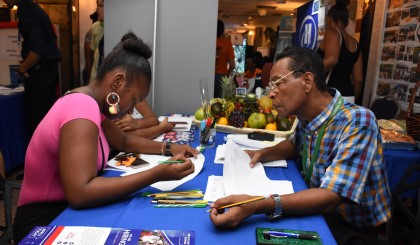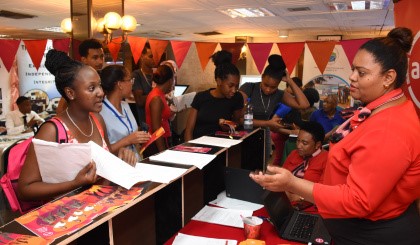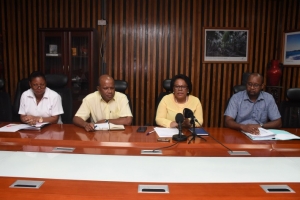Employment ministry organises fifth annual job fair
The Ministry of Employment, Immigration and Civil Status organised its fifth ‘My First Job Fair’ yesterday at ICCS in Victoria.
The ‘My First Job’ programme was launched in 2016 with the aim of helping young graduates from the professional centres to secure employment, as soon as they exit their respective schools, as well as to assist those who wish to venture into entrepreneurship.
To date over 2084 graduates have secured employment, of whom 39 have made remarkable progress in their career paths and have been promoted to occupy higher positions in their respective organisations.
As is usually the case, over 44 organisations needing manpower had submitted their lists of jobs so that the freshly graduated from post-secondary schools could have a look at the options available to them.
The fair had the participation of companies such as the Seychelles Civil Aviation Authority, Kempinski Hotel, Le Relax Hotel Ascent projects, Absa limited, the judiciary and many more.
“This fair is mainly for students who have completed their studies at post-secondary level, it serves as an opportunity for them to browse different organisations that are looking for young employees,” said Letimie Dookley, director general of employment and promotion at the Ministry of Employment.
Ms Dookley added that once these graduates are employed, the ministry does a follow up for one year to monitor their progress in the work place.
“The government has provided a 40% incentive on each student’s salary for the one year under the scheme,” said Ms Dookley.
In 2019 alone, the ministry registered six hundred and sixty-five students under the employment scheme.
Stephanie Rigodon, the human resource officer for Allied Builders and Le Relax hotels, noted that Allied Builders has thirty five vacancies for various sections while Le Relax has four vacancies.
“We are advertising our positions for new graduates; however, if there are skilled workers interested we will very much welcome them,” said Ms Rigodon.
She noted that one challenge they face with graduates most of the time is their lack of interest for the job itself. However the HR officer remarked that they do have some motivated workers that they hired at past fairs still with the company.
Ascent Projects, which was being represented by Caraline Ruchends, noted that the company has vacancies in four companies that fall under Ascent Projects.
“In the past, we took a few students, however most of them don’t stay long either to pursue another career or further education,” said Ms Ruchends.
She noted that one challenge they have is the lack of commitment as they don’t complete their training.
Companies were not the only ones recruiting at the fair as the University of Seychelles were also there to display their courses on offer for undergraduate programme.
“We participate every year to showcase our training courses that we offer at the university,” Monica Françoise, the marketing executive for UniSey, said.
The Seychelles Civil Aviation Authority (SCAA) was one of the dedicated companies that has been participating in the fair for years.
Paul Quatre, the SCAA recruitment officer, said that the goal of the company is to hire as many Seychellois workers as they can.
“Usually we don’t target a lot of students as we have certain criteria we are looking for and most students don’t like to work shifts,” noted Mr Quatre.
He also echoed some of the same challenges that the other companies face in terms of graduates only wanting a career and not a job.
Nineteen-year-old SBSA graduate Ashley Bastienne said she came to the fair with the aim of finding a job as soon as possible and she was satisfied as there were many vacancies for her to choose from.
She noted that this fair is a good initiative as choosing a first job can be intimidating and this process makes it so much easier.
Since the scheme’s inception, the government has spent R10 million on it so far.
The accompanying photos by our photographer Jude Morel show some highlights of the fair.




Christophe Zialor
Employment minister, key officials give details on President Faure’s SONA announcements
Following President Danny Faure’s announcements in relation to increases in certain categories of the gainful occupation permit, financial contribution of foreign workers to the local pension scheme, among others, employment minister and her team have given more details on the declarations.
This was during a meeting with the media on Tuesday afternoon.
Employment, Immigration and Civil Status Minister Myriam Télémaque reminded everyone present that the Minister for Finance, Trade, Investment and Economic Planning Maurice Loustau-Lalanne announced the introduction of two categories of gainful occupation permit (GOP) fees in his budget speech last year to take effect in 2020:
- For non-Seychellois employees who are in the country for more than six years, the fee was to be increased from R500 to R1,000 per month;
- For non-Seychellois employees who are in the country for more than 10 years, the fee will be increased from R500 to R5,000 per month.
But in his state-of-the-nation address last week, President Danny Faure reviewed the announcement made in the budget. He noted that “the private sector expressed their concerns with this increase they felt was too high. We listened, and we have decided that GOP rates for foreign workers working in Seychelles for less than 12 years will stay at R500. The GOP rate for foreign workers employed in Seychelles for more than 12 years will be R2,000 a month from March 1 this year. The GOP rate for live-in carers and domestic workers will remain at R500 a month irrespective of the number of years.”
It is to be recalled that the last increase in GOP fees was in 2016.
Minister Télémaque explained that in relation to the foreign live-in carers and domestic workers whose number is less than 300 currently, the government has decided not to touch this category of workers in the spirit of compassion as these workers work closely with disabled, old people who need care and attention on a 24-hour and seven days a week basis and have therefore well integrated and form part of the families they work for.
Erica Dufresne, principal immigration officer, explained that with the review they are not expecting any major changes in the GOP application and renewal processes. She noted that it is mainly the verification and monitoring process to ensure the length of service of the foreign workers has been correctly calculated that will need to be stepped up.
“The DICT (department of information communication and technology) has worked on a programme which will capture all foreign workers in the country onto a system which will automatically indicate the length of time a particular worker has been here once his or her name is entered,” Ms Dufresne explained.
She went on to add that this will help officers reduce the amount of time spent on the process.
“We are not anticipating that this new process will impact on the time limit to deliver on the permits which remains one to five days,” added Ms Dufresne.
She also said that immigration employees are currently undergoing training to familiarise themselves with the new monitoring system in preparation to kick starting in March.
Meanwhile in relation to the government’s introduction, several years back, of a plan to localise certain posts occupied by foreign workers, the president has recognised that its implementation has been marred by many challenges.
He noted in his SONA that in spite of many years of investment by government in human resource development, today we still see certain categories of Seychellois professionals with the required skills and experience not occupying key positions in big companies. As a result, he announced that the government has decided that as from May 1 this year, for certain key posts in big companies, the GOP rate will increase to R5,000 a month.
This measure will apply only to big companies with a revenue of over R50 million a year. With regard to this announcement, Minister Télémaque told the press that more details will be made available as soon as they have finalised all the details of the different posts.
Meanwhile, as highlighted in its Labour Migration Policy, the quota system for recruiting construction workers has also been reviewed and therefore seen a remarkable increase and Minister Télémaque said this will no longer be decided on a percentage but on a figure basis. The review will take effect as from March 15.
Explaining the related process put in place to be followed, principal secretary for employment Jules Baker detailed that it has been some time now since national consultations at various levels have been taking place to come to an agreement as how best to allocate foreign workers in different sectors of the country’s economy.
“In all the discussions the quota system introduced in 2014 has been the sticking point, thus leading the ministry and its different partners and stakeholders to review the needs and demands of each sector individually,” PS Baker affirmed.
For the construction sector, for instance, PS Baker said there were lots of discussions and the companies aired their concerns and challenges they face to recruit on the local market, to compete for tenders for different national projects among various other related issues as the quota system then was 75% for companies in class one, 70% for those in class two, 60% for class three and 50% for class four.
With the increase in economic development in the country, PS Baker said the ministry after intense consultations decided to reconsider the quota system in numbers instead of percentage as follows: Class one up to 300 foreign workers, class two 150 foreign workers, class three 75 and class four 40 foreign employees.
PS Baker noted that this review has been well received by the construction sector.
But PS Baker stressed that the ministry will have a mechanism in place under the Labour Migration Policy to ensure that companies employ Seychellois workers alongside their specific quotas of foreign employees.
Meanwhile, PS Baker also noted that work is underway to finalise a quota system for other sectors.
With regard to the president’s announcement that as from June 1 this year, foreign workers will also contribute 3% of their salary to the Seychelles Pension Fund (SPF) and will in return receive 25% of their contributions when they stop working in Seychelles, Minister Télémaque told the press that for the time being her ministry cannot make any comments as they need to work on the right mechanism with the Ministry of Finance, Trade, Investment and Economic Planning as well as the SPF.
Concerning the issue of compensation for stevedores, Minister Télémaque said this also is an issue which is yet to be finalised.
Marie-Anne Lepathy
Complements of Seychelles NATION





